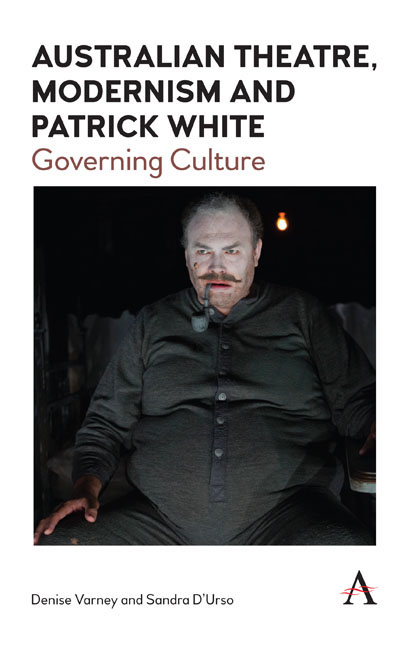Book contents
- Frontmatter
- Contents
- List of Illustrations
- Acknowledgements
- Introduction
- 1 The Archive, Governance and Sovereignty
- 2 ‘Words Fail Me’: The Ham Funeral and the 1962 Adelaide Festival
- 3 Night on Bald Mountain and the 1964 Adelaide Festival
- 4 The ‘Clowns’ Who ‘Cling to the Past’: A Sovereign Decision and the Practice of Exclusion
- 5 The Sovereignty of the Plays and Opportunities for New Publics
- Index
5 - The Sovereignty of the Plays and Opportunities for New Publics
Published online by Cambridge University Press: 29 May 2019
- Frontmatter
- Contents
- List of Illustrations
- Acknowledgements
- Introduction
- 1 The Archive, Governance and Sovereignty
- 2 ‘Words Fail Me’: The Ham Funeral and the 1962 Adelaide Festival
- 3 Night on Bald Mountain and the 1964 Adelaide Festival
- 4 The ‘Clowns’ Who ‘Cling to the Past’: A Sovereign Decision and the Practice of Exclusion
- 5 The Sovereignty of the Plays and Opportunities for New Publics
- Index
Summary
Dramas of rejection and artistic opposition rarely play out as neat didactic narratives where the weak are overpowered by the strong, as in Carl Schmitt's friend– enemy distinction. The inevitably messy alliances, collusions, eruptions and flows of affect cannot be contained by applying easy binaries. When we consider the governing bodies involved in the Patrick White Affair, there were disagreements and tensions between members of the Board of Governors and tempers to be assuaged. While affect was projected onto Sir Lloyd Dumas in Harry Medlin's recollections decades after the fact, it is often scripted out of the adversarial negotiations documented in the Adelaide archives.
In arts’ governance, the stakes of life and death are not as they are in war. It is nonetheless critical to stress that the friend–enemy criterion is to some degree reproduced in the lesser scenarios of arts’ governance. Schmitt denounces the appearance of these lesser versions of politics, revisited in such quarrels as those that occurred between the Governors, Medlin and White. Here, the Board's function is not political in the grand sense of governing and protecting the sovereignty of an entire nation but it stands in as a lesser reproduction of governance. In Schmitt's view, an authentic political authority can only be enacted or shown via the sovereign's decision. The adversarial relationships displayed by members of boards and committees cannot be considered authentic politics in this theorization of what constitutes authority.
However, whether or not arts enmities are authentically political in the Schmittian sense has not really been a guiding question for this book. While there is some wisdom to be gained from Schmitt's denouncement of tactics parading as politics, the behaviour of the Adelaide Festival of Arts’ Board of Governors, along with the Australian Elizabethan Theatre Trust and other players, indeed resembles a degraded political plot, a drama populated with caricatured esquired men who scheme and create intrigue. They are Governors who behave like Shakespeare's Roman tribunes but with the gravitas of the Emperor. Unlike Schmitt, we are not seeking to theorize the constitution of an authentic political sphere, which is best achieved by the political sciences, rather we seek to understand how the arts becomes embroiled in cultural politics and in so doing becomes a virtual political sphere, re-performing the behaviour of the state.
- Type
- Chapter
- Information
- Australian Theatre, Modernism and Patrick WhiteGoverning Culture, pp. 105 - 110Publisher: Anthem PressPrint publication year: 2018



